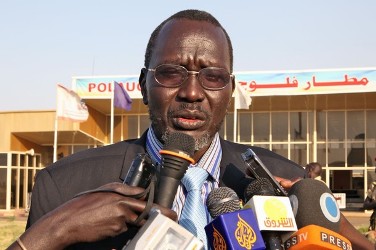Civil society is a watchdog in fighting corruption: Petroleum minister
By Julius N. Uma
September 3, 2012 (JUBA) – Civil society in South Sudan should be strengthened and fully supported if the country is to fully fight any form of corruption in the country’s extractive industries, Stephen Dhiew Dau, South Sudan’s minister for petroleum and mining said on Monday.

“The only way to prevent corruption in a system with such massive and rapid movement of oil and wealth is to be absolutely open in our affairs. Your role as civil society is of upmost importance in the fight against corruption in the oil and mining sector,” Dau said in his speech read by his advisor, Chuor Deng Mareng.
The petroleum minister, in his statement at the opening of a three-day experience sharing conference on natural and public resource governance, also reiterated the South Sudan government’s full commitment to openness, honesty and full disclosure of the ministry’s affairs to public scrutiny.
He further pledged to enforce regulations of the Petroleum and Mining Ministry, in regard to the implementation of accountability and transparency aspects as stipulated in the draft Petroleum and Mining Act of South Sudan.
“(..)…our draft Mining Bill contains provisions that support and confirm transparency of payments and revenues in accordance with the Extractive Industries Transparency Initiative,” the minister’s statement reads in part.
South Sudan President, Salva Kiir, in May this year, wrote letters to 75 unnamed former and current government officials, asking them to account for around $4bn, allegedly looted from the state treasury. Members of the civil society alliance later held a public protest demanding that the President makes public the names of those implicated.
Weeks later, Deng Athuai Mawiir, the head of the South Sudan Civil Society Alliance was kidnapped, beaten and tortured by unknown attackers over his anti-corruption stance, attracting widespread condemnation both locally and internationally.
In a related development, Prof. Jenik Radon, an expert on oil said any engagement in the extractive industry must take into consideration elements such as human compensation, environmental impacts assessments and the need to save and invest for the benefit of South Sudanese citizens.
“You need to protect and preserve the environment of you are to avoid the risk associated with it on the community,” Prof Radon told the conference organized by Justice Africa and supported by Cordaid.
He, however, warned South Sudan against over reliance on the extractive industry to support its budget, saying the prospects of its sustainability are very narrow in the long run.
“The country’s budget should be funded from money got through taxing salaries of the citizens, not from oil money,” he said.
Landlocked South Sudan heavily relies on oil to fund its budget, with oil accounting for nearly 98% of its revenues. In January this year, however, the country shut down its oil production following a dispute over pipeline and transportation fees with neighbouring Sudan.
The young nation also accuses Khartoum of allegedly confiscating its oil entitlements worth about US$815m.
Both Sudan and South Sudan will this week begin their next round of post-independence talks on oil and other outstanding issues in Addis Ababa, Ethiopia facilitated by the Thabo Mbeki-led African Union High Level Implementation Panel (AUHIP).
(ST)
